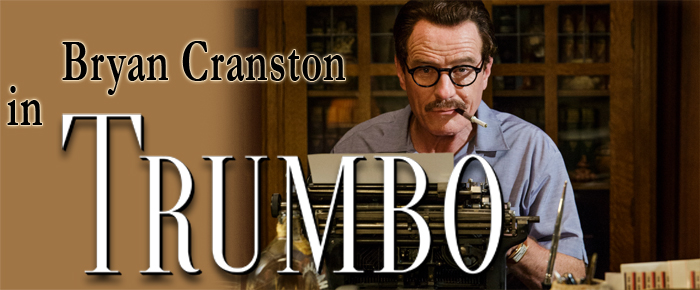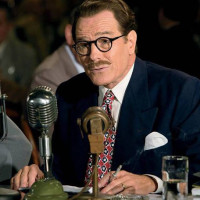
Bryan Cranston plays blacklisted screenwriter Dalton Trumbo in the critically praised film TRUMBO. He and the film are getting a lot of attention. Do some of the controversies in Trumbo’s life resonate with us today? Recently, I had the privilege of speaking with Mr. Cranston about this, among other things. What follows is a part of our conversation. ~ Robin E. Simmons
How did you get attached to TRUMBO?
It came through my agency. They wanted me to take a look at the material and talk to [director] Jay Roach and see if it was something I’d like to do. I was in Boston doing “ALL THE WAY,” a play about LBJ and I was struck by the similarity of the characters in relationship to the protection of civil rights — but in very different ways. Interesting that this came along when it did. I was attracted to the story as a bit of Hollywood history and American history. I got together with Jay, we talked it over, and I said, “I’d like to do this.” And so did he.
So TRUMBO came out of the blue? It wasn’t something you nurtured and personally developed?
No. I was a hired hand.
How much about Dalton Trumbo did you know before you signed on to the movie?
I knew he was blacklisted and a communist. I knew he went to jail. And I knew the name “The Hollywood Ten.” I knew Trumbo wrote THE BRAVE ONE and SPARTACUS. Outside of that, I didn’t know all that much. I was delighted to spend time doing my research, finding out all about him, his friends and the “red scare” of the 40’s and 50’s – and 60’s for that matter.
Is there a lesson in Trumbo’s experience?
Well, I think so. Anytime liberty is lost or being suppressed is cause for great alarm. Especially in a society that prides itself on these First Amendment rights – freedom of speech, freedom of assembly, freedom to practice whatever religion you choose and freedom to be in whatever political affiliation you choose. These are hard-fought rights. And the reason they are the First Amendment is because they are the foundation of our country. All that was being threatened and abused by an overreaching branch of the government. TRUMBO is very much a cautionary tale.
I’m reading a book about the infamous witch trials in Salem. The author suggests there are intermittent waves of suppression, paranoia and fear that regularly sweep across America and I was thinking of the House Un-American Activities Committee (HUAC) and the seemingly endless Benghazi “hearings” being in that vein.
Yes. I agree with you. The wave of suppression in that case — and in Trumbo’s — is fear mongering. Scare people enough and they will adjust their actions and way of thinking. It’s a shameful act because it’s usually done for political power or financial gain. A shameful, shameful act.
I hearken to Dick Cheney who in the mid-term election of George Bush said – I’m paraphrasing – it’s essential that in this election we make the right choice because if we make the wrong choice that danger is we will be hit again on American soil and this time maybe even more catastrophic than 9/11. That is fear mongering 101!
If I had the opportunity to meet Dick Cheney, I wouldn’t yell at him, I wouldn’t berate him, I wouldn’t turn up my nose in disgust, I would just approach him and say three words: “Shame on you.”
Frankly, I’m surprised he’s still free.
It’s amazing.
In my opinion, he was instrumental in creating the horrible circumstances we find in the Middle East and world today.
Yeah.
Playing Trumbo, did you learn anything about yourself?
Yes. In the sense that I asked myself: What would I do? At the time, sixty-five percent of the country believed that communist influence was a major, major threat to our safety. The fear mongering was nurtured and perpetuated. If I was brought to that House Un-American Activities Committee, and sworn under oath with the threat of imprisonment and was asked: “Are you now or ever have been a member of the communist party?” I think what I would have said, “Yes, but I regret that decision.” They would have given me a slap on the wrist. So far, so good. But the next question they did ask is: “Fine. We’ll accept that answer. Youthful folly. Mistakes are made. But now we want you to tell us who else is a member of the communist party. And if you don’t (answer), you’ll be found in contempt of congress.” And that’s where I’d say, “I’m not going to tell anything about anyone else. I’ll answer all your questions about me. But I’m not going to talk about other people.” And I would have been prosecuted.
Trumbo spent, what, almost a year in prison?
Right. Eleven months.
Was Trumbo grandstanding?
He was for real. What I found out about him was that he was a man who did not seek this fight. He wasn’t a martyr. But when the fight came to him, he also wasn’t the kind of man to back down. It was self-defense. People said to him, “Use the fifth amendment.” Taking the fifth protects you from self-incrimination but Trumbo had committed no crime. So if he took the fifth, in the public eye he’d appear guilty. And that would only perpetuate the fear. Which is not the message they [the Hollywood Ten] wanted to say. They were confident that if they rested on the First Amendment the committee would understand. But they didn’t. The lower court didn’t understand and eventually the Supreme Court didn’t see it that way.
In the movie, how much does the Motion Picture Alliance — which supported HUAC — and John Wayne factor into the story?
Quite a bit. Of course, in a film you have to truncate the story. The two people who represent the conservative right are John Wayne and on the far right is gossip columnist Hedda Hopper who was a very powerful woman of her day who could make or break careers – and did.
Has Kirk Douglas seen TRUMBO?
He has. In fact, not only has he seen it, but was consulted before the film was even made. So he was aware of the script. He saw the movie and I went to his house and talked to him about it, hoping we did an honorable job depicting not only the era but also his heroic actions that hugely contributed to the end of the blacklist. He said he had one complaint about the movie and I braced myself. He said, “Why wasn’t I asked to play Kirk Douglas?”
When Anthony Quinn was preparing for a part, he said when he knew how the character walked he could play him. Peter Sellers said it was discovering the voice. Lawrence Olivier said it was a dab of nose putty that helped him pretend. Is there anything you do in preparing for a part? Is there one thing you look for?
When I start to play a character, I don’t even know what I’m looking for. In fact, you can’t know because the character is outside of you. In the quiver of an actor, you pull out arrows. One is personal experience, others are imagination, research and talent. Put all that together and those four elements go to work.
With a non-fiction character there’s more responsibility there to pay homage and respect to the real person who lived. In recent history like TRUMBO, you have more of an advantage as opposed to playing someone like Richard II.
When you were considering your life’s work, was there a moment you knew you could act and made a commitment to the craft?
In sixth grade, I got Best Actor in my class! I thought that was pretty good. It was mostly visual stuff. I did book reports by acting them out. It was much easier than writing it and I excelled at that. I kinda put that aside until I had an experience in college when I did a scene with a girl my age – she was eighteen years-old – and I thought she was really into me. We were doing a scene where we were kissing. She was really kissing me and I thought, my God, I’m in! Great. And so at the break, I asked her out. And she looked at me seriously – almost like I was a lost puppy – and said, “No. No. I have a boyfriend.” I walked away and I was flabbergasted. First of all, my head was spinning because the way she was kissing me but wasn’t into me. How could she do that? She was acting! The power of acting! And I completely believed it to the point of asking her out because I thought for sure she’d say yes. Imagine the head-spinning of a nineteen year-old boy. And that’s what happened. So I learned first-hand the power of how influential an actor could be.
Beyond fame and fortune, what is the personal reward for you in acting?
Empowerment! You say a word or a sentence on stage and the audience could gasp, or laugh or grumble. At a curtain call they could be angry with you or smiling broadly for you. Anything is fair. You have moved people’s emotions. That’s a very powerful thing. It’s an empowering act to be able to change someone’s emotion. Even someone on a street corner or someone you bump into telling a joke and you laugh. It’s a powerful thing.
Is there a movie or performance you never tire of watching?
The first thing that comes to mind is ON THE WATERFRONT. Ironically directed by Elia Kazan [who cooperated with HUAC]. Brando is at his peak, I think. Karl Malden’s perfect. Rod Steiger is sublime. And the story! [Quoting lines from the movie] “Tell me. Who did this to you!” And, “I don’t rat. I don’t rat.” And then there’s the story of forgiveness! Which is also the story of the blacklist.
I never thought of ON THE WATERFRONT that way.
In our movie, at the very end, Trumbo capitulates and offers an olive branch to everyone affected. He does so in earnest. And he was actually criticized for this because his friends wanted him to lambaste his opponents. But his point of view was: I don’t want to be a peacock crowing because we won this battle. Everybody was damaged. Everybody was hurt. There were no victors in this. And no villains. There were only victims.
What’s amazing to me is that Dalton Trumbo — even during the blacklist when writing under another name — continued to embed his best screenplays with notions of freedom.
He had something to say. And that’s why we’re so proud of our movie – it too has something to say. It’s a serious movie. But we handle that in an entertaining way. And the reason for that is two-fold: One, that’s who these men were. They’re brilliant writers. Wordsmiths. They were witty, charming and self-deprecating. Jiving and teasing each other. So yes, it’s going to be clever and witty. And the other thing is, quite frankly, it’s a better movie. It’s not a civics lesson but a piece of entertainment.
I think movies work best when they don’t have an overt agenda.
Yes.
Alan Rickman said: “Actors are agents of change. A film can change the world.” How does that resonate with you? Do you think movies matter on that kind of scale?
It can. Movies like MR. SMITH GOES TO WASHINGTON, FOREST GUMP or ET could start to create a softer, kinder and gentler world. Magic. It could soften people.
Maybe there’s really only one basic question: Do we live in fear or with love? Does it finally come down to that?
Yes.
Stan Laurel said if he weren’t an actor, he’d like to manage a stationary store [Big laugh from Cranston]. If you weren’t an actor, what would you most likely be?
At first, I’d say maybe a general manager of a baseball team. My world is urban and I long for a kind of rural setting, so if I were to get away from it and change things, I might be a naturalist giving tours of a national park, or in a place that’s breathtakingly beautiful.
Regarding stage acting. Does the “vibe” of an audience affect performance?
It does to some degree. And sometimes it’s not to the betterment of the performers. If an audience is really with you and laughing and laughing, you could change your performance to go a little “bigger” and broader. And by doing that, you’re changing the character. So you have to temper that. You have to appreciate the reaction without letting it force you into an objective viewpoint. You never want to become objective onstage. Or in film. You want to stay subjective and in character. Ideally, your awareness of these technicalities remains at a subconscious level.
Is it hard to shed a character when the show’s over?
It can be. The more you do it the easier it is. It becomes a muscle memory. Much like an athlete gearing up for a game, putting on the pads in the locker room. Same thing with an actor putting on the wardrobe and make-up. Shaking the day loose and starting to focus on what you need to do the task at hand.
I heard stories that LBJ literally sold his soul to become president. But when he got it, he slowly became unhinged, refused to run for another term, retired at his ranch and went stark-raving bonkers. His psychiatric records remain classified. When researching the part of LBJ for “ALL THE WAY,” did you find any truth to these rumors?
No. A man who sold his soul without ambition would not have taken on the civil rights act of 1964. A landmark legislation! The voting rights act of 1965. Medicare and Medicaid. And all the domestic achievements he was able to get passed. A soulless man would never be able to do that.
Is there a story you’re chasing or a character you’d like to play?
I tend to not look too far into the future. We shot TRUMBO over a year ago and it takes a lot of energy to get back into that mind-set to promote the film. And that’s where I am now.
Are you going to play Marvel’s immortal supervillain Mr. Sinister?
That’s something that came up at Comic-Con. I would like to play it. But whether I do or not is another question. I know they are planning to make the movie and Mr. Sinister is an integral part of it. That’s a comic book character I’d love to figure out. So it’s a possibility.
Is there a motto you live by?
No. I can’t say there’s a motto. I just try and live right and take advantage of everything life has given me and taught me over the years. I try to be a good person and create. And support the next generation of people who want to create.
* * *














































